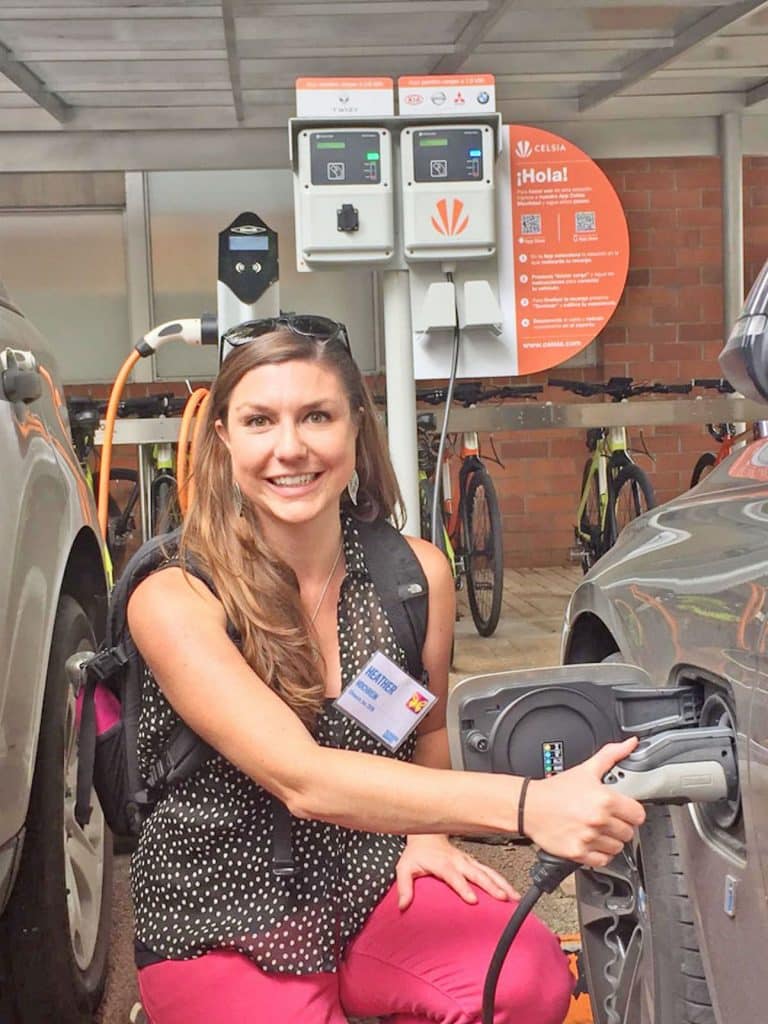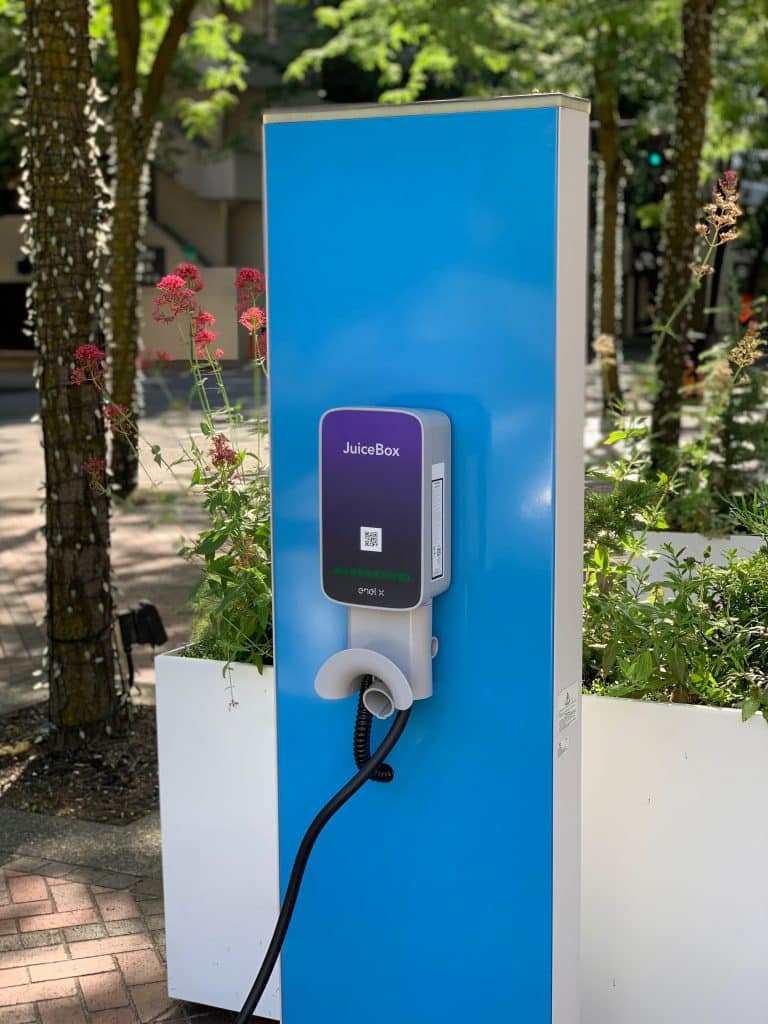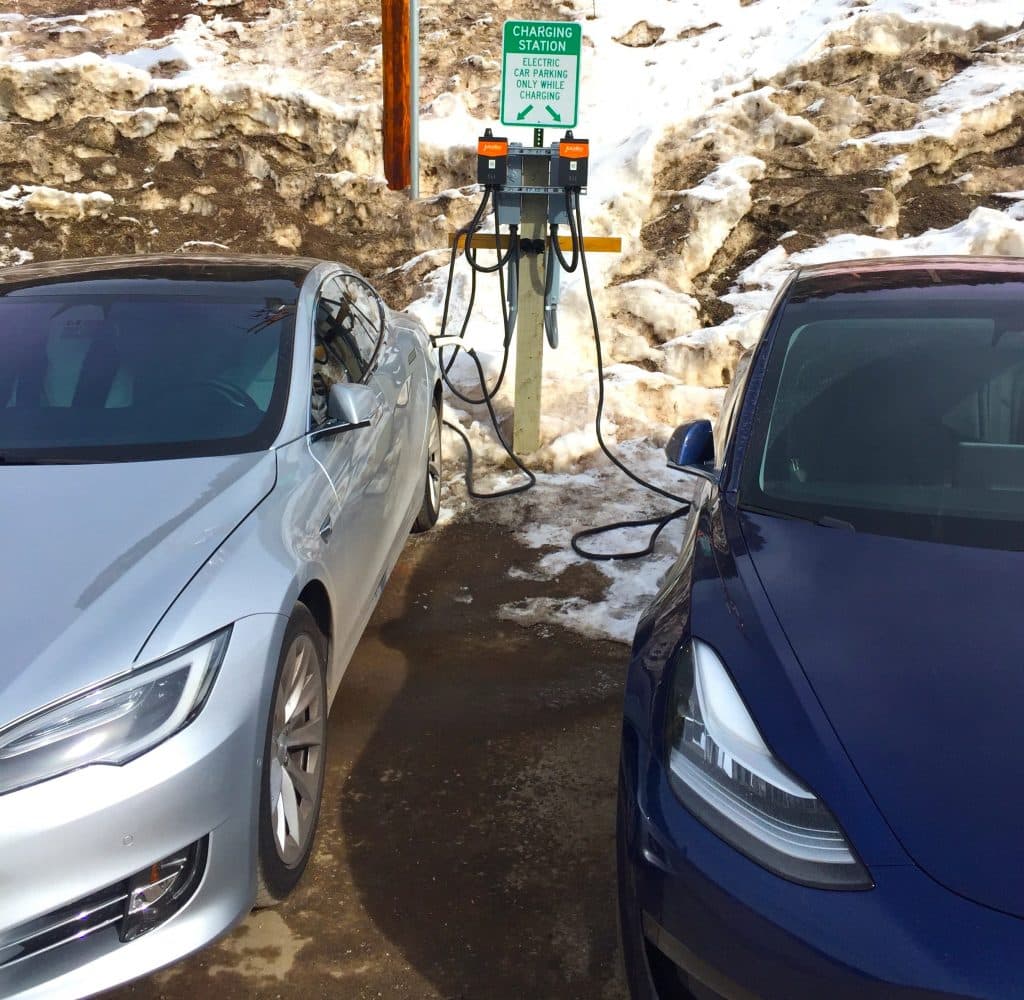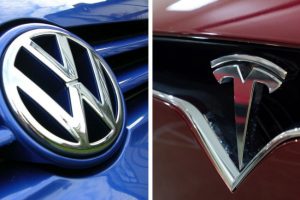Santa Barbara-grown EVmatch has developed an innovative system to allow charging station owners to share their chargers with EV drivers—sort of an Airbnb for charging, if you will. The company was recently honored with the Global Warming Mitigation Project’s Keeling Curve Prize, which includes a cash grant of $25,000.

“What we will specifically be doing with the award is expanding our community-based EV charging network to disadvantaged communities in Chicago,” founder and CEO Heather Hochrein told EVannex. “This prize money will go to local businesses and nonprofit organizations in Chicago to pay for charging hardware and installation services, and then they’ll be able to make those chargers available to the public through our EVmatch software.”
Why Chicago? “EVmatch is targeting individuals who don’t have access to home charging, and we found that Chicago is a really underserved city in terms of publicly available charging infrastructure. Outside of the downtown area, there’s very limited EV infrastructure. Chicago also has a high percentage of renters and apartment dwellers, and we saw an opportunity to leverage local community businesses and churches located in neighborhoods that will really benefit from having a Level 2 charging station that’s available to the public. We also found that the state of Illinois has aggressive EV adoption goals, but there’s been less investment in EV charging infrastructure compared to states such as California.”
The dilemma of apartment dwellers and others who don’t have the option of installing home charging, meaning pretty much anybody who doesn’t have a dedicated off-street parking space—is emerging as a real barrier to EV adoption. “It’s a challenging segment in terms of the chicken-or-egg problem,” says Hochrein. “Right now, most EV drivers are not renters or multifamily residents. And some might argue that that’s because of the high cost of the EV, but limited access to EV charging stations and limited home charging access really seems to be a huge barrier to adoption.”
“In California, about 10% of EV drivers are renters. In dense areas like Chicago, where 40% or more of the population are renters and live in multifamily apartments, we really have to accelerate adoption of EVs among that demographic in order to meet these aggressive EV adoption goals and climate action goals. There’s certainly a push from the policy arena to get more folks who live in apartments driving EVs. However, there’s still been a lack of investment in terms of the charging infrastructure to make the consumer feel confident that an EV will work for their lifestyle. We’re working to bridge that gap.”
The last time we spoke with Ms. Hochrein, EVmatch was in the process of rolling out a new “subnetwork” feature, which allows a customer to create a small EVmatch network within their property. “We have continued to invest in our multifamily products,” she tells us. “We’ve coupled our software system with Enel X hardware, and we’ll be working with some other hardware vendors this year. We provide a low-cost solution for property owners, so multifamily property managers can install just a handful of chargers onsite, and then the tenants can use our software to efficiently share those chargers. They actually book a specific time to use the chargers, and we manage the payment processing. That makes it very easy for a property manager to recoup the cost of electricity. And if they’d like, they can also rent those chargers out to the general public.”
“We are also working to develop infrastructure in community locations—local businesses, churches, other nonprofits that can be in the neighborhood and serve individuals who don’t have charging at their multifamily property,” says Hochrein.
Churches are good candidates for community charging sites, because they tend to be in or near residential areas, they usually have large parking lots that see little use for most of the week, and many of them are keen to help the environment and serve the local community.
“For this [Chicago] pilot, we’ve already pre-identified a majority of the site hosts, and many of them are churches,” says Hochrein. “With our software, the church could set it up so that only the congregation can use the charging equipment on Sundays, or whichever day they hold services. Then the other days, when their parking lots are vacant, the chargers can be made available to the community. They can create specific user groups and we can manage that through access codes, and they can also set different prices for different user groups. For example, the congregation members could have free charging and the general public might pay 20 cents a kilowatt-hour or $2 an hour.”

EVmatch works with charging solution provider Enel X in a couple of different ways. “We are a reseller for Enel X hardware and their hardware is integrated with our software. We have the ability to turn the Enel X JuiceBox on and off with our software, which is how we enforce our reservation. We have many projects where we will couple the Enel X JuiceBox with the EVmatch software, but we’ve also found there are some projects where Enel X will be selling to a large customer, an enterprise customer, for example, and if the customer wants a reservation system, then Enel X will bring us in. And that’s a very unique feature that EVmatch has.”
“For example, we’re working on a project at a workplace where the employer wants a reservation system so that the employees can book a specific time to use the charging station. In that project, it will be Enel X hardware and EVmatch software for the reservation system.”
The fleet market is emerging as a growth area for innovative providers of charging solutions. EVmatch hasn’t had a large focus on fleets just yet, but Hochrein see a huge opportunity in that space. “We would offer a turnkey service where we provide the hardware, we support the installation, and then we operate the software. What is particularly interesting about EVmatch for fleets is that the hardware would be primarily for serving that fleet and there’d be dedicated hours when the fleet vehicles receive priority access, but then for all those other hours of the day when those vehicles are out driving around, there’s an opportunity to leverage that infrastructure for public use. At those times, the infrastructure could be made available to the public and reservable through EVmatch.”
“That’s particularly interesting if you have more and more delivery vehicles in neighborhoods,” says Hochrien. “Companies might want to site infrastructure near their routes, then you can have this nice sharing of infrastructure between the delivery vehicle and members of the public. Then you can actually have greater utilization of that asset, and the company that owns the infrastructure and the fleet operator could increase their returns on investment in that infrastructure.”
Another emerging trend in the charging field is the increasing involvement of utilities, many of which want to become charging providers. However, there’s been some resistance from independent charging operators, who don’t want to see utilities dominate the charging business. “There’s certainly some pushback on utility proposals to own and operate EVSE from state public utility commissions, and I think there’s a good reason for that,” says Hochrien. “There is some concern that the utilities will monopolize the market and have an unfair advantage, and then there will be less competition and less consumer choice.”
“However, I also think that utilities need to play a huge role in the development of EV charging infrastructure. And part of that is that that’s who the customers look to when they’re thinking about their electricity usage. That’s a very common thought process for site owners, property owners, even homeowners. They’re looking to the utilities for guidance: ‘How do I install EV charging? How’s that going to impact my bill?’”
“EVmatch can interact with utilities in either scenario. If the utility is owning and operating the equipment, they will likely put out bids for service providers to do much of the work. In that case, our site hosts, as we call them, would be the utilities as opposed to individual building owners, and our model can be adapted to that.”
EVmatch is no stranger to working with utilities. “We are running a few utility pilots, one with Burlington Electric Department and one with Silicon Valley Clean Energy in California. And in those cases, the utility is providing funding for the infrastructure, but they do not want to own and operate, or they’re not authorized to own and operate.”

EVmatch doesn’t own and operate any chargers, so it can play a constructive role regardless of who owns and operates the chargers, or whether the operator is charging a fee or giving the electrons away. That flexibility will be a great asset if, as many expect, providing public charging evolves into a low-margin commodity business. Many observers see providing services that make the charging ecosystem work as a more promising business model than trying to make a profit from selling electrons.
Hochrein seems to agree. “I think that the margins on the electricity itself are very minimal, but there is service provided in the EVSE operation, the software services, and so we do charge a software service fee to our site hosts. We also charge a transaction fee to the driver, but there are some limitations on that margin. I also think that the value that EV charging providers offer is often a marketing or an amenity-based value—it helps them retain employees or attract tenants. So, the willingness to pay for software services that improve the customer experience is there, because these property owners see that there’s value beyond just providing electricity. It’s becoming an amenity or required amenity for tenants, commercial tenants or residential tenants, and I think that’s only going to increase over time as more and more people drive EVs. There is this willingness to pay on the property owner side to have a good customer experience with EV charging.”
Original Publication by Charles Morris at EVANNEX.
Want to buy a Tesla Model 3, Model Y, Model S, or Model X? Feel free to use my referral code to get some free Supercharging miles with your purchase: http://ts.la/guanyu3423
You can also get a $100 discount on Tesla Solar with that code. No pressure.





